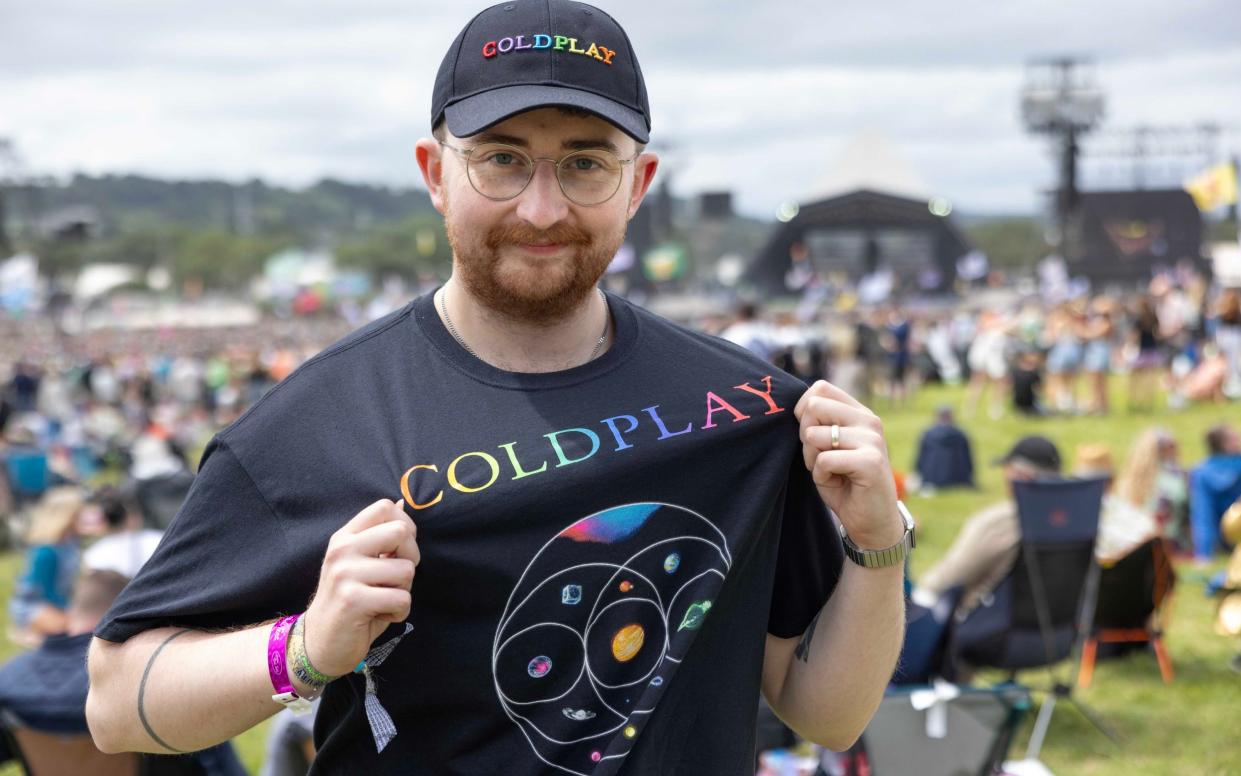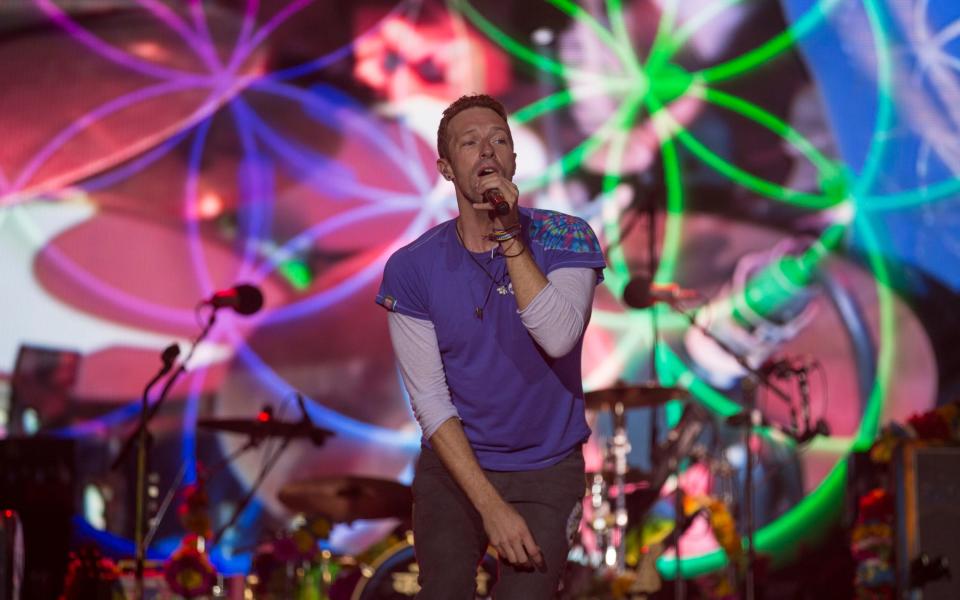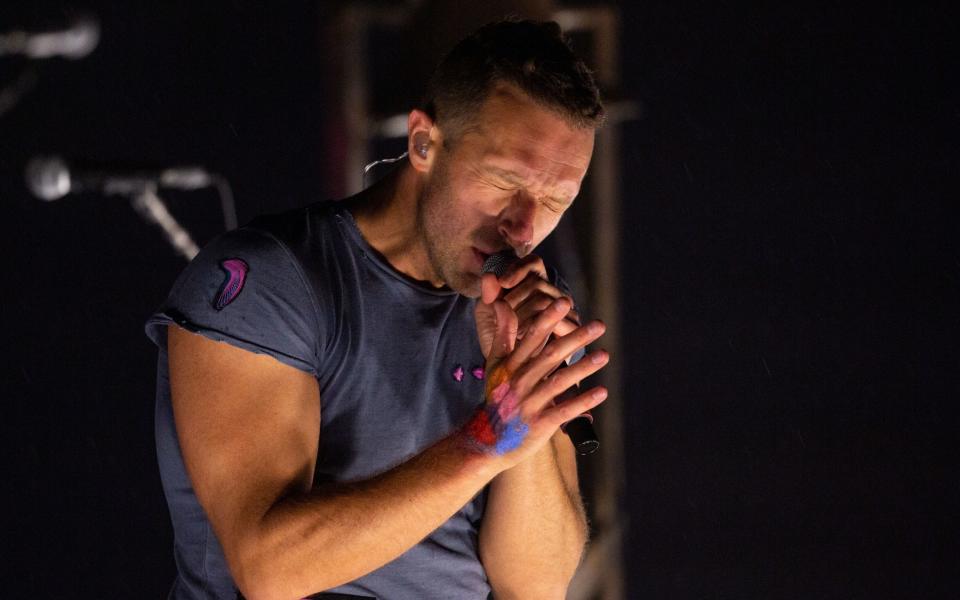I can’t wait to see Coldplay play Glastonbury again. Am I alone?

Long before he won global acclaim for writing Succession, Jesse Armstrong wrote some of British TV’s most memorable lines this century in Peep Show.
One of the show’s finest exchanges comes when Jez, played by Robert Webb, argues with his sometime heroin addict mate Super Hans about what they should serve in the pub they propose to open. He is desperate to sell at least one type of lager and nuts, “because people like lager and nuts”, and not just Hans’s homemade scrumpy.
“People like Coldplay and voted for the Nazis,” Hans replies. “You can’t trust people, Jeremy.”
In just 13 words Hans, played with sardonic aplomb by Matt King, captures the ambivalent attitude Brits feel towards one of the most successful music acts we have ever produced better than any music writer has or could. It is a line that is quoted at me, as an unironic Coldplay fan, ad nauseam.
It’s long been cool to hate Coldplay, and when they were named the Saturday night headliners for Glastonbury this year – for a record-breaking fifth time – the announcement was met with everything from incredulity to boredom and outright hostility.
I don't want to labour the point, but in 2024 booking Coldplay to headline Glastonbury is like booking Kevin Bacon to front an EE ad.
— Olly Bellamy (@OllyBellamy) March 14, 2024
Even Chris Martin, the band’s Tiggerish frontman, is said to have been “surprised” and “embarrassed” by the request from organiser Emily Eavis, even going so far as to suggest that she ought to book someone else.
“He was like, ‘Are you joking?’ All of the band absolutely love performing at the farm, but Chris’s initial thought was that there must be other big names out there who deserved a shot at headlining,” an anonymous source briefed the tabloids. “When Glastonbury came back and said they still wanted Coldplay, of course he said yes. To him, it will always be an honour, but surely it was someone else’s turn.”
Yes, it may feel a little uninspiring to have Coldplay back again, especially as their show has not changed all that much since they last headlined in 2016, but ask yourself: who is a) big enough and b) available enough to play one of the biggest gigs in world music? Taylor Swift is busy on her $1 billion world tour, this weekend in Dublin; Madonna declined this year because, apparently, the fee was too low.
So, a case for the defence. They’ve had nine UK number-one albums, sold more than 100 million records worldwide, their current tour is set to gross $1 billion (making them the first band in history to achieve that and just the second artist, after Swift) and have had 32 billion streams on Spotify, putting them 15th on the all-time list, with 80 million listening to them each month. The only British act ahead of Coldplay is Ed Sheeran.
Their most popular songs are, by any measure, great bangers: Yellow, Viva La Vida, A Sky Full of Stars, The Scientist. Yet despite this success — and their ability to go from upbeat bangers like Higher Power to hymnal tearjerkers such as Fix You to sing-along anthems like A Sky Full of Stars, all in the same gig — they have been the victim of a form of snobbery seemingly at odds with reality.
It is a peculiarly British phenomenon that Sheeran, and Adele, also suffer from. Because they’re popular, especially beyond these shores, it has become a national pastime to mock them and say that, actually, they’re not up to much. In 2005, the same year as Super Hans’s criticism, one journalist described them as “the most insufferable band of the decade”; a later record was described as “one long stagnant f—ing pool of premium grade f—ing cockwash”. The Guardian, in one of its kinder reviews, called them “grindingly tedious”.

So why the animus? Perhaps it is because Martin leaps and bounds around the stage, even now he is 47, like a toddler at a soft play centre for the first time. Maybe it is the fact that Coldplay’s songs can seem like they were written with a stadium audience in mind, full of bromides rather than any deeper meaning.
Martin makes himself an easy target at times. His marriage to Gwyneth Paltrow became the subject of much mockery, and he has been accused of hypocrisy for preaching about climate change but using a private jet to tour the world.
Here the attitude towards Coldplay is, ahem, mixed. “You come to see a f—ing rock band kick the sh— out of the Pyramid stage,” says an unimpressed Rob Liston. “They are not that. It’s just Chris Martin, isn’t it? They’ve been doing the same thing for ages.”
Most festival-goers are much more indifferent, with a shrug of the shoulders greeting questions about their feelings towards the band. “I don’t hate them, but they’re not my cup of tea,” is a typical answer from Tod Hodge. Emily Storr tells me: “It’s a bit of an anti-climax, isn’t it?”
Even the outfits reflect a general lack of enthusiasm for Coldplay. The merchandise stands near the main stages are teeming with clobber for the likes of Dua Lipa – and a huge amount for Shania Twain. But there is no Coldplay kit in sight.

Other than my own (official, advance-purchased) merch there is nary a visible fan of the band in sight, save for a woman on Friday night decked out in a canary-coloured one-piece with “It was all” written on her forehead. For the uninitiated, that’s a reference to one of the band’s most famous lyrics. Perhaps the tens of thousands who inevitably flock to the Pyramid to see their gig could be best described as “shy Coldplayers”.
Coldplay are not edgy – their current tour is literally called Music of the Spheres – but the last time they were here they closed the show just three days after the Brexit referendum and a crowd overwhelmingly made up of Remainers had been utterly demoralised. Yet Martin and the band performed a cathartic role that year and they lifted the mood in a way that I cannot imagine any other artist doing. As well as their own bangers, they played a classy tribute to Viola Beach, the tragic band who died in a Swedish car crash a few weeks before, and got everyone dancing when they brought out Bee Gee Barry Gibb to play Stayin’ Alive. It remains one of the most memorable gigs I have ever been to.
As if to illustrate the point, the first two people in the queue to get into Glastonbury this year were two men from South Korea, Jin Hyun-kim and Joung In-kim, who had travelled almost 6,000 miles to experience Worthy Farm for the first time. Had they come to see Seventeen, the K-pop juggernaut? “No,” Hyun-kim said. “Only Coldplay.”

 Yahoo News
Yahoo News 
